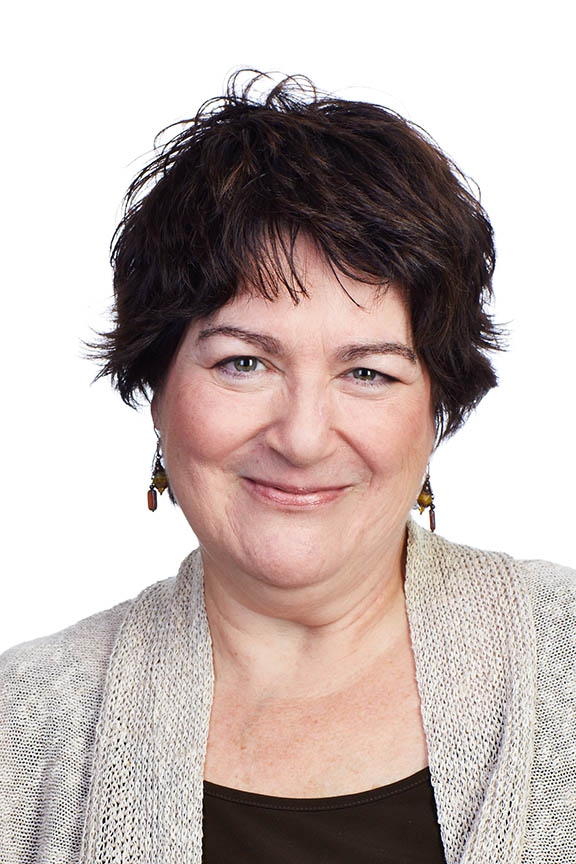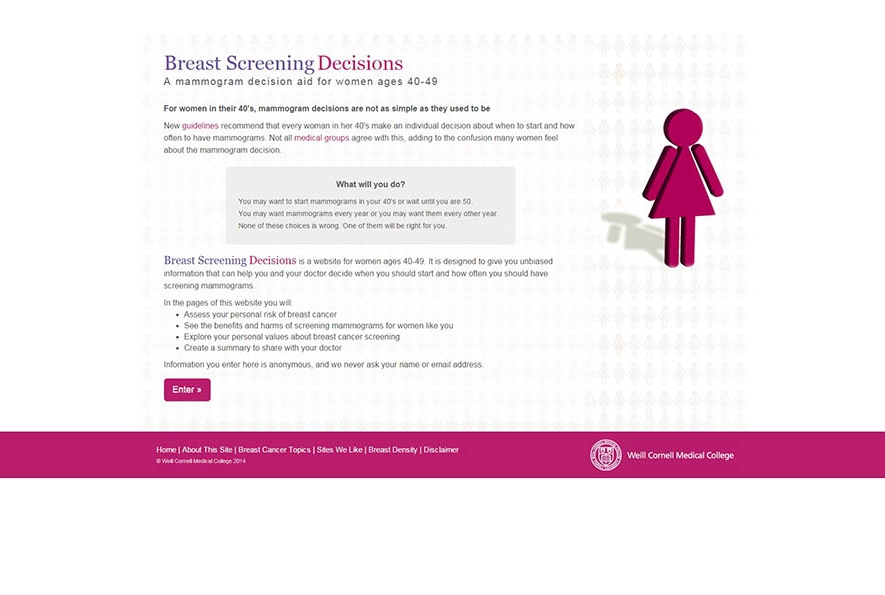Alison Shurell's 40th birthday wasn't merely the celebratory start of a new decade. As it is for many women who reach that milestone, turning 40 for Shurell meant thinking hard about when to start screening for breast cancer.
It's a decision made more complex by conflicting recommendations from government and professional societies. No longer is there a consensus that all women should begin receiving annual mammograms at 40. The confusion is forcing women and their doctors to weigh a variety of considerations in the midst of uncertain outcomes, a process that a new website may help focus.
The site, Breast Screening Decisions, opened Shurell's eyes to factors that she never knew affected her risk of disease, such as when she began menstruating and whether she had children. It explained to her the difference between screening and diagnostic mammograms and the prevalence of false positives and false negatives. The site also sparked conversation among her friends, she said, by asking them to consider their values around when and how often to have mammograms.
"This tool is a personal tool," said Shurell, a marketing executive from Manhattan. "It's individually profiling you to help you get a better sense of your own risk of breast cancer, and then shows you screening outcomes for women like yourself. That's more meaningful than anything you are going to read in an article or newspaper."
Launched on Dec. 15 by physicians at Weill Cornell Medical College and Memorial Sloan Kettering Cancer Center, Breast Screening Decisions includes a breast cancer risk assessment, information about possible screening mammogram outcomes for women who have similar risk and the screening options available to them. It also provides women with a summary of their own risk and possible mammogram outcomes, and helps them clarify their concerns and beliefs about screening, especially their tolerance for uncertain screening results and treatment outcomes.

Dr. Margaret Polaneczky
"Our goal is not to drive women towards or away from mammograms," said co-developer Dr. Margaret Polaneczky, an associate professor of clinical obstetrics and gynecology at Weill Cornell. "Our goal is to help decrease confusion and help women make an informed choice about mammography that both they and their doctors can feel good about."
For more than three decades, expert groups in the United States have recommended annual or biennial mammograms for women in their 50s and 60s. But recommendations for women in their 40s have changed over time and been a source of great controversy. In 2009, the U.S. Preventive Services Taskforce released new recommendations that advised against routine screening mammograms for women ages 40-49 — a reversal of prior guidelines. The panel instead advised women in their 40s to make individual decisions about screening mammography in collaboration with their physicians and in the context of their personal breast cancer risk, values and preferences. Not all medical professional organizations and societies agreed. The conflicting advice stoked confusion among both patients and their doctors.
"If I was confused, I suspected my patients were, too," Dr. Polaneczky said. "I had to do a lot of digging to find out why in the world someone would want to do anything but an annual mammogram."
She studied the recommendations and all of the known information about the value of mammograms and published her take in her blog, "The Blog That Ate Manhattan." To Dr. Polaneczky, it was a real reality check. While mammograms reduce breast cancer deaths by about 15 percent, that risk reduction is much lower than the public has been led to believe, she reported. And it comes with a price. In addition to a false-negative rate of about 10 percent, mammograms have high rates of false-positive results. A woman having annual mammograms between the ages of 40 and 50 has a 50 percent chance of a false positive during that decade, she noted. Finally, all the cancers that mammograms do detect are not necessarily life threatening, but nonetheless force women to face the possibility of treatment. She summarized this information using graphics that communicate risks visually. The Washington Post hailed the post as "the clearest assessment of the controversy you're likely to find."
"That's when I knew I was on to something," Dr. Polaneczky said.
She also knew that even when she educated her patients about mammograms, most ultimately chose to have the screening.
"It's about more than the numbers," she said. "Coming to a decision about screenings requires women to confront their own values and concerns about mammograms and breast cancer: How worried are they about getting breast cancer? How much information do they want to know? How much uncertainty can they tolerate?"

Dr. Elena Elkin
In collaboration with Dr. Elena Elkin, a researcher at Memorial Sloan Kettering Cancer Center, Dr. Polaneczky decided to build a website that would incorporate those factors as women considered the quantitative evidence around screening. Armed with a grant from the Clinical and Translational Science Center at Weill Cornell, they worked with experts in mammography and breast cancer to ensure that the site included the most up-to-date information about breast cancer risk and screening outcomes while making it easy to navigate and understand. They tested it on more than 150 women receiving routine preventive care at Weill Cornell last year.
She and Dr. Elkin found that the majority of patients who used the website before a scheduled appointment with their doctor discussed breast cancer screening during their appointment, according to early findings presented to the Society for Medical Decision Making, a professional society dedicated to improving health outcomes by advancing proactive approaches to clinical decision making. One month after their visit, most women who used the website reported that they had a screening mammogram, scheduled an appointment for a screening mammogram or were planning to make an appointment in the next six months. Since participation in the study was voluntary, researchers didn't compare these outcomes with those from women who used other websites or no website at all.
While the website poses a series of questions to help women explore their values, it doesn't dictate how their feelings should factor in to the decisions they make. That's by design, Dr. Polaneczky said.
"This is individual. This is about you figuring out what's important to you, not what your girlfriends are doing," she said. Eventually, the site may include a social media component so women can see what other people in their risk groups are doing.
"It's helpful to get clarity around what's important to us when we make a decision," Dr. Polaneczky said. "It's also important to make decisions based on realistic possible outcomes, not out of state of fear or anxiety.
"False positives are incredibly anxiety-producing," she added. "Even when you‘re in the waiting room and you're called back for an additional view, your life flashes before your eyes. Hopefully the decision aid can take some of the anxiety out of that for women and they can begin to understand that most abnormal mammograms are not breast cancer, but are just a statistical probability of the screening test we happen to use."
Around the time of her second scheduled mammogram last year, Shurell's gynecologist recommended that she check out the website. Based on her low risk of disease, it supported their previous decision to screen every other year. But less than a month later, Shurell's mother was diagnosed with stage 2 breast cancer. She had chemotherapy and radiation and is responding well to treatment, her daughter said. While testing shows that her mom's disease is not genetic, the diagnosis was a game-changer.
"It was quite a scare," said Shurell, now 43. "My mom was diagnosed and that changed everything."
Shurell tried the tool again and recalculated her risk. She noticed the small benefit of screening for breast cancer every year rather than every other — precisely the advice her doctor gave her. Now, Shurell and her two sisters are committed to having annual mammograms.

